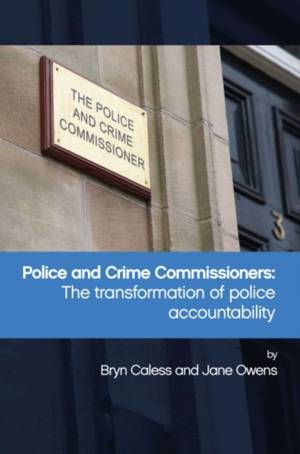
Door een staking bij bpost kan je online bestelling op dit moment iets langer onderweg zijn dan voorzien. Dringend iets nodig? Onze winkels ontvangen jou met open armen!
- Afhalen na 1 uur in een winkel met voorraad
- Gratis thuislevering in België vanaf € 30
- Ruim aanbod met 7 miljoen producten
Door een staking bij bpost kan je online bestelling op dit moment iets langer onderweg zijn dan voorzien. Dringend iets nodig? Onze winkels ontvangen jou met open armen!
- Afhalen na 1 uur in een winkel met voorraad
- Gratis thuislevering in België vanaf € 30
- Ruim aanbod met 7 miljoen producten
Zoeken
Police and Crime Commissioners
The Transformation of Police Accountability
Bryn Caless, Jane Owens
Paperback | Engels
€ 79,45
+ 158 punten
Uitvoering
Omschrijving
Police and Crime Commissioners (PCCs) are elected representatives whose role is to ensure that police forces in England and Wales are running effectively. Intended to bring a public voice to policing and hold the police to account, the holders of this controversial role also control budgets and strategic planning. Bryn Caless and Jane Owens obtained unprecedented access to the PCCs and their chief police officer teams and undertook confidential interviews with both sides. The results reveal the innermost workings of the PCCs' relationships with the police, media, partners and public. The authors analyse the election process (in which PCCs polled the lowest local mandate ever) and consider the future of this politically-contested role. Examining the PCCs' impact on policing, this fascinating book makes essential reading for Police Crime Commissioners, chief officers, police officers, police trainers and academics, students and researchers in criminology and policing.
Specificaties
Betrokkenen
- Auteur(s):
- Uitgeverij:
Inhoud
- Aantal bladzijden:
- 256
- Taal:
- Engels
Eigenschappen
- Productcode (EAN):
- 9781447320708
- Verschijningsdatum:
- 1/04/2016
- Uitvoering:
- Paperback
- Formaat:
- Trade paperback (VS)
- Afmetingen:
- 155 mm x 231 mm
- Gewicht:
- 399 g

Alleen bij Standaard Boekhandel
+ 158 punten op je klantenkaart van Standaard Boekhandel
Beoordelingen
We publiceren alleen reviews die voldoen aan de voorwaarden voor reviews. Bekijk onze voorwaarden voor reviews.











